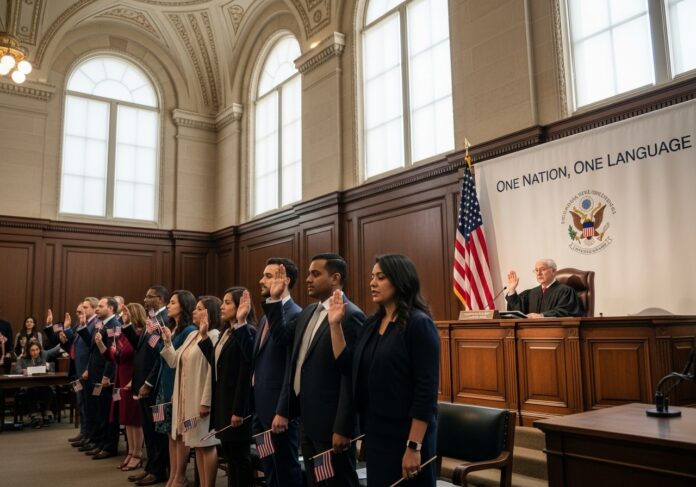
If you want to live in America, learn the language. That’s not xenophobia—it’s common sense. And finally, under President Trump’s leadership, the federal government is putting that principle into policy. The Department of Justice announced it will be reducing the use of foreign languages in government services, signaling a long-overdue return to national unity through a shared language: English.
This new directive is part of a broader initiative stemming from President Trump’s executive order declaring English the official language of the United States. It’s a move that reflects what most Americans already believe—that our nation functions best when we speak the same language, and that expecting newcomers to learn English is not a burden, but a reasonable expectation.
Attorney General Pam Bondi put it bluntly and brilliantly: “The DOJ will eliminate wasteful virtue-signaling policies across government agencies to promote assimilation over division.” That’s the kind of straightforward leadership we haven’t seen in years. Instead of bending over backwards to cater to every linguistic niche, the focus is now on helping immigrants integrate, not isolate. That means redirecting taxpayer funds from endless translation services to English education and real assimilation efforts.
Let’s get real: multilingual government services don’t foster inclusion—they entrench separation. When you can live in America for years without ever learning the language, you’re not encouraged to assimilate. You’re encouraged to stay in a linguistic bubble, dependent on the state and disconnected from the broader civic culture. That’s not compassion. That’s soft bigotry masquerading as virtue.
This change is not about cruelty or exclusion. It’s about uniting Americans around a common identity. As Trump’s executive order plainly states: “Our Nation’s historic governing documents, including the Declaration of Independence and the Constitution, have all been written in English. It is therefore long past time that English is declared as the official language of the United States.” That’s not nationalism—it’s reality.
Consider what this means in practice. Under previous administrations, agencies like the Department of Homeland Security spent millions translating materials and providing live translation services for virtually every caller. That’s now coming to an end. If you want to check your immigration status or ask about work permits, you’ll need to do it in English. And if you can’t, the answer isn’t more government pampering—it’s English education.
The left will cry foul, of course. They’ll scream “racism” or “exclusion” or “anti-immigrant.” But they’re wrong. This is pro-immigrant in the most meaningful sense. It’s about treating immigrants like future Americans—people capable of learning, adapting, and thriving in this country. It’s about rejecting the condescending liberal narrative that says immigrants are too fragile to be expected to learn English.
And let’s not forget the fiscal side of this. Translation services across the federal government cost taxpayers hundreds of millions of dollars each year. That’s your money and mine funding bureaucratic bloat in the name of political correctness. Now, with this new directive, we’re finally cutting waste while strengthening national cohesion. That’s a win-win for taxpayers and patriots alike.
The truth is, a country without a common language isn’t a country—it’s a confusion. And for too long, we’ve allowed fear of offending someone to override the basic need for cultural unity. President Trump and Attorney General Bondi are changing that, and not a moment too soon.
This is a rallying cry for every American who believes in the melting pot—not the salad bowl. We don’t need more hyphenated identities. We need E Pluribus Unum—out of many, one. One people. One flag. One language.
That’s not extremism. That’s the American way.
